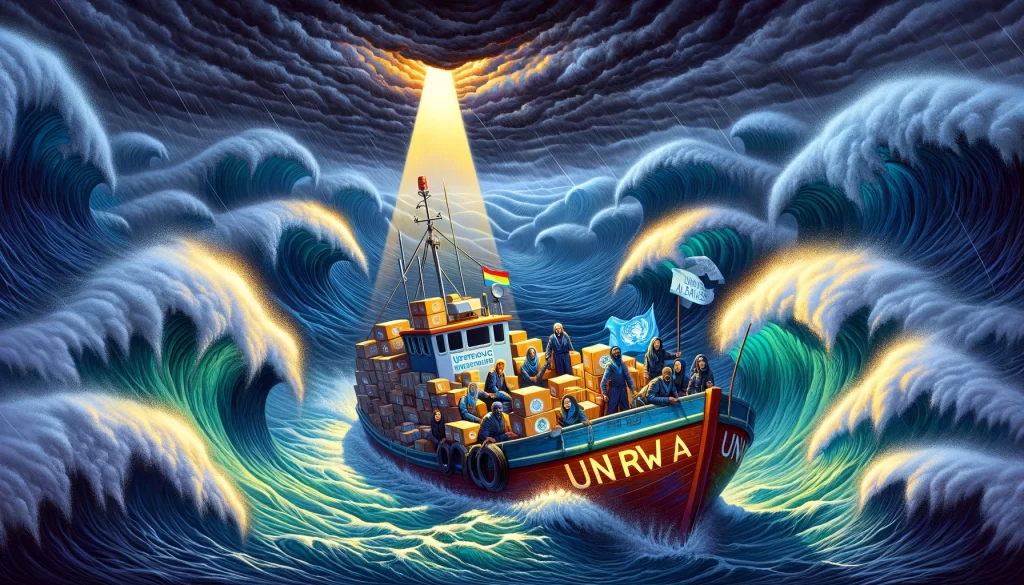In mid-January, a significant event unfolded involving the United Nations and its efforts to support Palestinian refugees. Philippe Lazzarini, who leads the UN agency known as UNRWA, dedicated to helping Palestinian refugees, found himself in a challenging position. He was given a list of 12 employees accused of participating in an attack by Hamas on October 7. However, the Israeli diplomat who provided the names did not offer any proof. Despite this, Lazzarini decided to take action by planning to dismiss the accused employees who were still alive and supported conducting an in-depth, independent investigation into the matter.
Understanding the critical nature of keeping the agency’s largest donor—the United States—on board, especially with Gaza facing extreme hardship, Lazzarini traveled to Washington, D.C. He aimed to ensure the U.S. continued its support. UNRWA plays a vital role in Gaza, a region on the edge of a severe famine. Without the backing of the U.S. and its allies, UNRWA would struggle to provide the necessary aid.
However, the Biden administration chose to temporarily stop funding UNRWA before the results of the investigation were even out. This decision was made even though only a tiny fraction of UNRWA’s employees – 12 out of 13,000 – were accused of wrongdoing. Critics argue that this move endangered the primary organization equipped to address the humanitarian crisis in Gaza. Scott Paul, an expert at Oxfam, pointed out that UNRWA is crucial for the region, as it provides up to 80% of the aid there.
Following the U.S.’s lead, over a dozen other countries, including Germany, the UK, and Canada, also halted their contributions. This collective action placed UNRWA under immense financial strain, with around $450 million in donations being put on hold. William Deere, a senior advisor for UNRWA in Washington, expressed that the agency was facing its limits, barely managing to survive month to month.

Despite a temporary relief when the European Union provided some funding, UNRWA still faced a significant funding shortfall. This situation exemplifies the broader biases and challenges in the response to the conflict in Gaza. While Israel continues to receive substantial support from the U.S., including military aid, there’s been a noticeable lack of accountability for its actions in Gaza, despite international criticism and evidence of potential violations of human rights law.
Netanyahu’s government in Israel has been particularly keen on diminishing UNRWA’s influence, seeing it as a persistent reminder of the Palestinian refugees’ right of return to their former homes. Despite the United States’ long history of supporting UNRWA, the quick withdrawal of U.S. support surprised even Israeli officials.
Experts like Khaled Elgindy of the Middle East Institute criticized the decision to suspend UNRWA’s funding based on unproven allegations, highlighting the double standards in the U.S. policy towards Israel and Palestine. The conflict has led to a significant loss of life, primarily affecting women and children, and worsening the humanitarian situation in Gaza.
The suspension of UNRWA funding by the U.S. and its allies underscores a complex web of geopolitical interests, humanitarian needs, and the challenging balance of responding to allegations of misconduct. While the U.S. attempts to navigate these waters, the immediate and tangible effects on the ground in Gaza, including the looming threat of famine and the loss of life, highlight the urgent need for a balanced, fair, and humanitarian-focused approach.
This article is based on the following article:

Background Information
Understanding these elements can help the reader better comprehend the complexities of the situation described in the article, including the humanitarian implications of funding decisions, the geopolitical dynamics at play, and the human impact of the longstanding Israeli-Palestinian conflict.
1. United Nations Relief and Works Agency for Palestine Refugees (UNRWA)
– What it is: UNRWA is a UN agency created in 1949 to support the welfare and human development of Palestinian refugees. Its services include education, healthcare, relief and social services, camp infrastructure and improvement, microfinance, and emergency assistance, including in times of armed conflict.
– Why it was created: Following the 1948 Arab-Israeli conflict, hundreds of thousands of Palestinians were forced to flee their homes. UNRWA was established to provide them with critical support and assistance.
– Who it serves: UNRWA supports millions of Palestinian refugees, including the descendants of those originally displaced in 1948, in the Gaza Strip, the West Bank, Jordan, Lebanon, and Syria.
2. Palestinian Refugees
– Definition: Palestinian refugees are individuals and their descendants who were displaced from their homes in what is now Israel and the Palestinian territories during the 1948 Arab-Israeli War and subsequent conflicts.
– Right of Return: Many Palestinian refugees and their descendants hold to the right of return, the belief that they should be allowed to return to their ancestors’ homes in what is now Israel and the Palestinian territories.
3. Gaza Strip
– Location and Control: The Gaza Strip is a small region on the eastern coast of the Mediterranean Sea, bordering Egypt and Israel. It has been under the control of Hamas, a Palestinian Islamist political organization and militant group, since 2007.
– Humanitarian Situation: The Gaza Strip faces a severe humanitarian crisis due to blockades, conflicts, and economic difficulties. These have led to shortages in essential supplies, including food and medicine, and have significantly affected living conditions.
4. Conflict Background
– Israeli-Palestinian Conflict: This long-standing conflict centers around mutual recognition, statehood, and territorial disputes. Efforts to resolve the conflict have been ongoing for decades but have yet to result in a lasting peace.
– Hamas and Israel: Hamas, which controls Gaza, and Israel have been in conflict since Hamas took control of the territory. This conflict has led to several wars and ongoing tensions, including restrictions on movement and goods in and out of Gaza, contributing to the humanitarian crisis.
5. Role of International Aid
– UNRWA’s Importance: UNRWA plays a critical role in providing humanitarian assistance to Palestinian refugees, especially in Gaza. It operates schools, health clinics, and provides food assistance and emergency services.
– International Funding: The operation of UNRWA heavily depends on voluntary contributions from UN member states. The United States has historically been one of its largest donors, making decisions by the U.S. to suspend funding particularly impactful.
Please subscribe to Insight Fortnight, our biweekly newsletter!
